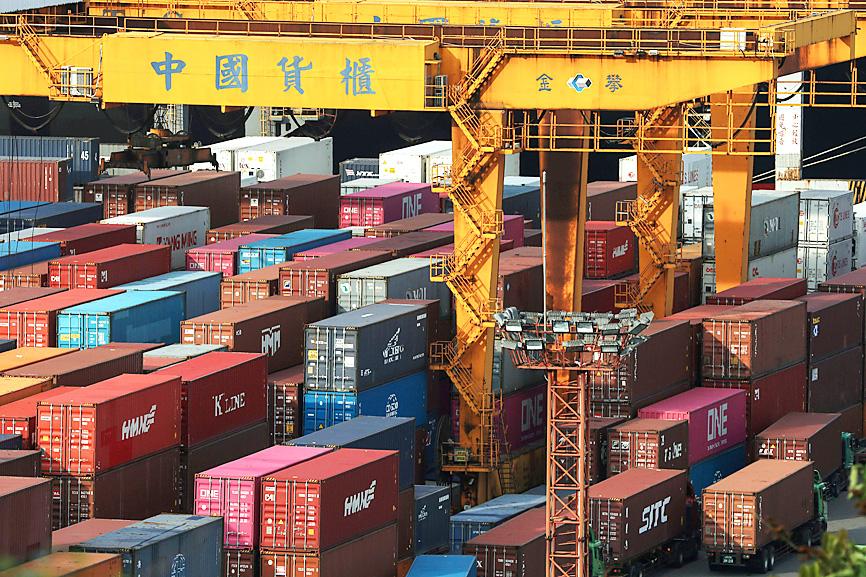The nation’s exports last month slid 3.8 percent from a year earlier to US$27.13 billion, as poor shipments of mineral, chemical and plastic products eclipsed record semiconductor sales, the Ministry of Finance said yesterday.
“Despite rebounds in international oil and raw material prices, demand for related products remained sluggish,” Department of Statistics Director-General Beatrice Tsai (蔡美娜) told a news conference in Taipei.
That was the reason shipments of mineral products plunged a record 65.5 percent, while shipments of chemical, base metal and plastic products declined 25.3 percent, 23.8 percent and 23.4 percent respectively, Tsai said.

Photo: Ann Wang, Reuters
Price factors aside, a languid global economy caused by the COVID-19 pandemic continued to weigh on demand, she said.
However, sales of electronic components were strong, increasing 23.9 percent to US$11.18 billion, with semiconductor shipments jumping 27.4 percent to US$10.25 billion, moving above US$10 billion for the first time, Tsai said.
The COVID-19 crisis spurred demand for devices used in remote working, learning and entertainment, Tsai said, adding that front-loading by China’s Huawei Technologies Co (華為) likely also supported semiconductor shipments.
Washington recently imposed new restrictions on the Chinese company’s use of US technology and equipment, which do not affect orders previously placed with Taiwanese suppliers.
Imports fell 8.6 percent to US$22.29 billion last month, as local firms cut back on imports of raw materials and capital equipment by 11.3 percent and 3.2 percent respectively, the ministry’s report showed.
The small decline in imports of capital equipment was no reason to worry, Tsai said.
Taiwan last month had a trade surplus of US$4.84 billion, an annual increase of 26.6 percent.
For the second quarter, exports shrank 2.4 percent from a year earlier to US$79.35 billion, while imports dropped 4 percent to US$67.52 billion.
Outbound shipments would remain in contraction mode this month, dropping 1.5 to 4 percent, Tsai said, hesitating to bet on seasonal movements, citing poor order visibility.
Companies in the 5G network deployment, laptop and data center supply chains are looking at a robust third quarter, but vendors of smartphone parts have adopted a conservative attitude.
Shipments to China last month increased 13.8 percent and those to the US rose 3.7 percent, thanks to tech sales, but trade with Japan, ASEAN members and Europe dropped by double-digit percentages, as economies are struggling to recover from the virus outbreak, the ministry said.
For the first six months, exports increased 0.5 percent from a year earlier to US$158.02 billion, while imports slipped 0.4 percent to US$136.67 billion, it said.

UNCERTAINTY: Innolux activated a stringent supply chain management mechanism, as it did during the COVID-19 pandemic, to ensure optimal inventory levels for customers Flat-panel display makers AUO Corp (友達) and Innolux Corp (群創) yesterday said that about 12 to 20 percent of their display business is at risk of potential US tariffs and that they would relocate production or shipment destinations to mitigate the levies’ effects. US tariffs would have a direct impact of US$200 million on AUO’s revenue, company chairman Paul Peng (彭雙浪) told reporters on the sidelines of the Touch Taiwan trade show in Taipei yesterday. That would make up about 12 percent of the company’s overall revenue. To cope with the tariff uncertainty, AUO plans to allocate its production to manufacturing facilities in

TAKING STOCK: A Taiwanese cookware firm in Vietnam urged customers to assess inventory or place orders early so shipments can reach the US while tariffs are paused Taiwanese businesses in Vietnam are exploring alternatives after the White House imposed a 46 percent import duty on Vietnamese goods, following US President Donald Trump’s announcement of “reciprocal” tariffs on the US’ trading partners. Lo Shih-liang (羅世良), chairman of Brico Industry Co (裕茂工業), a Taiwanese company that manufactures cast iron cookware and stove components in Vietnam, said that more than 40 percent of his business was tied to the US market, describing the constant US policy shifts as an emotional roller coaster. “I work during the day and stay up all night watching the news. I’ve been following US news until 3am

COLLABORATION: Given Taiwan’s key position in global supply chains, the US firm is discussing strategies with local partners and clients to deal with global uncertainties Advanced Micro Devices Inc (AMD) yesterday said it is meeting with local ecosystem partners, including Taiwan Semiconductor Manufacturing Co (TSMC, 台積電), to discuss strategies, including long-term manufacturing, to navigate uncertainties such as US tariffs, as Taiwan occupies an important position in global supply chains. AMD chief executive officer Lisa Su (蘇姿丰) told reporters that Taiwan is an important part of the chip designer’s ecosystem and she is discussing with partners and customers in Taiwan to forge strong collaborations on different areas during this critical period. AMD has just become the first artificial-intelligence (AI) server chip customer of TSMC to utilize its advanced

Six years ago, LVMH’s billionaire CEO Bernard Arnault and US President Donald Trump cut the blue ribbon on a factory in rural Texas that would make designer handbags for Louis Vuitton, one of the world’s best-known luxury brands. However, since the high-profile opening, the factory has faced a host of problems limiting production, 11 former Louis Vuitton employees said. The site has consistently ranked among the worst-performing for Louis Vuitton globally, “significantly” underperforming other facilities, said three former Louis Vuitton workers and a senior industry source, who cited internal rankings shared with staff. The plant’s problems — which have not